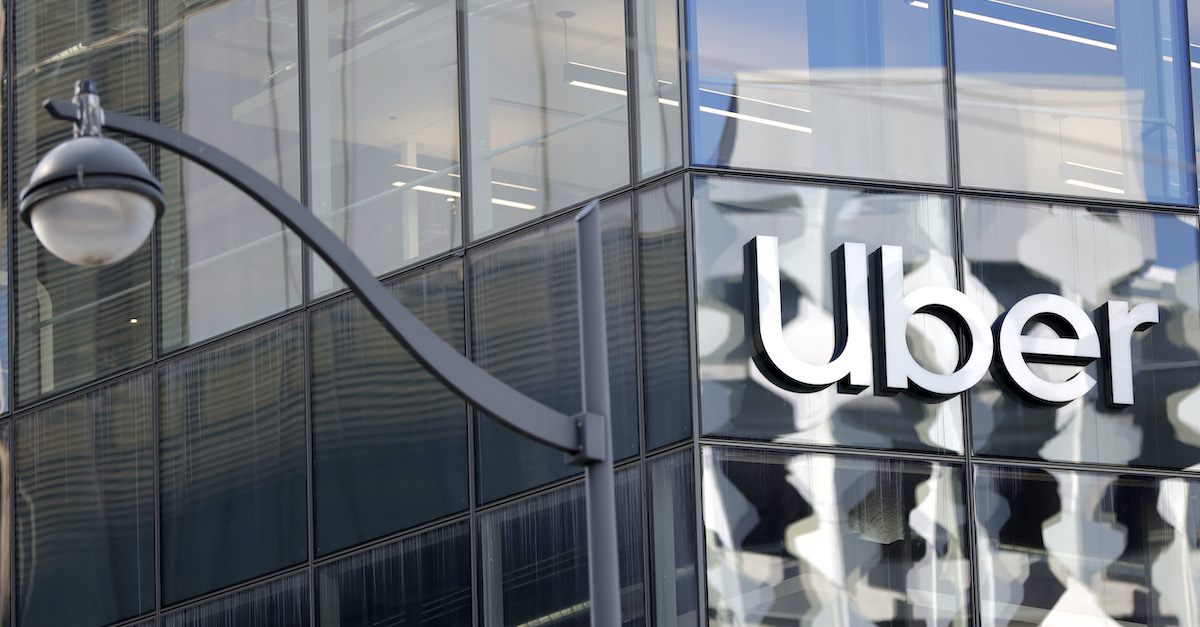
A sign is posted on the exterior of the new Uber headquarters on March 29, 2021 in San Francisco, California (via Justin Sullivan/Getty Images).
The Justice Department and Uber have reached a settlement agreement in the government’s civil rights lawsuit against the ride-sharing giant over alleged discriminatory fees imposed on riders with disabilities.
According to the DOJ, Uber will offer “several million dollars in compensation to more than 65,000 Uber users who were charged discriminatory fees due to disability.”
The company will also waive wait time fees for all Uber riders who certify that they, or someone they regularly travel with, need more time to get into the vehicle because of a disability. Uber has agreed to promote this waiver program and make it easier for people who didn’t sign up for the program to recover wait time fees, but if Uber decides to do away with wait time fees altogether, it is not required to maintain the waiver program.
As Law&Crime previously reported, the DOJ had sued Uber in November, alleging that the company had unfairly overcharged people who needed more time to get into and out of a car because of a disability.
Starting in April 2016, Uber had been imposing a “wait time fee” starting two minutes after a driver would arrive at a pick-up location, indicated via GPS tracking. As the complaint noted, some passengers — such as those with walkers or wheelchairs — may need more time than that.
“Many passengers with disabilities require more than two minutes to board or load into a vehicle for various reasons, including because they may use mobility aids and devices such as wheelchairs and walkers that need to be broken down and stored in the vehicle or because they simply need additional time to board the vehicle,” the complaint said.
According to the DOJ, Uber provided 2.3 billion trips in the U.S. from 2017-2018, including more than 3.1 million individual trips per day.
The two-year agreement provides that Uber will waive wait time fees “for all Uber riders who certify that they (or someone they frequently travel with) need more time to get in an Uber car because of a disability.” Uber will also make refunds “easily available” for anyone who does not have a waiver and is charged a wait time because of disability.
Under the settlement — which does not require Uber to admit that it discriminated against riders with disabilities — more than 65,000 riders who signed up for the waiver program will receive credit for double the amount of wait time fees they were ever charged. According to the DOJ, that could amount to “potentially hundreds of thousands or millions of dollars in compensation.”
“Uber will also pay $1,738,500 to more than one thousand riders who complained to Uber about being charged wait time fees because of disability, and $500,000 to other harmed individuals identified by the department,” the DOJ’s press release said.
“People with disabilities should not be made to feel like second-class citizens or punished because of their disability, which is exactly what Uber’s wait time fee policy did,” said Assistant Attorney General Kristen Clarke of the Justice Department’s Civil Rights Division in Monday’s press release. “This agreement sends a strong message that Uber and other ridesharing companies will be held accountable if their services discriminate against people with disabilities. The Civil Rights Division remains committed to enforcing the ADA and ensuring that people with disabilities can travel free from barriers and indignities.”
U.S. Attorney Stephanie M. Hinds for the Northern District of California said that the wait time fees were discriminatory, but the settlement agreement “removes that barrier to equal access for passengers with disabilities and provides a mechanism to compensate those harmed by Uber’s past wait time fee policy.”
Uber spokesperson Carissa Simons told Law&Crime in an emailed statement that the company was pleased to have reached the agreement with the DOJ.
“It has long been our policy to refund wait time fees for riders with a disability when they alerted us that they were charged, and prior to this matter being filed we made changes so that any rider who shares that they have a disability would have wait time fees waived automatically,” Simons said in the email. “We are always working to improve accessibility for all users and encourage riders with a disability to utilize our self-declaration form to have wait time fees waived.”
Simons noted that the “average wait time fee charged to riders in 2020 was less than 60 cents,” and that “wheelchair accessible trips on Uber WAV and Uber Assist trips (available in some major cities around the US) do not have any wait time fees by default.”
Read the settlement agreement here:
[Image via Justin Sullivan/Getty Images.]
Have a tip we should know? [email protected]